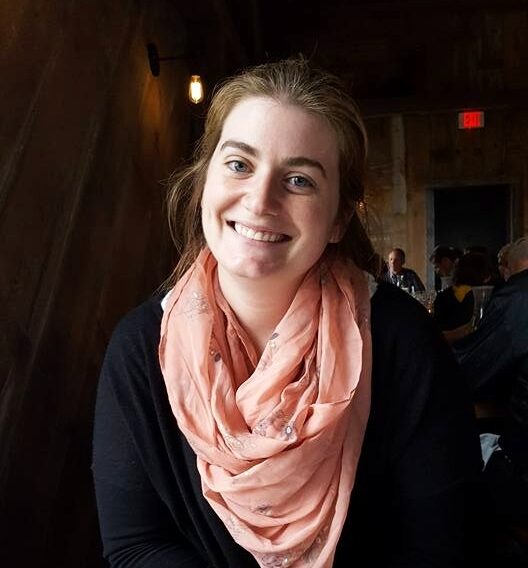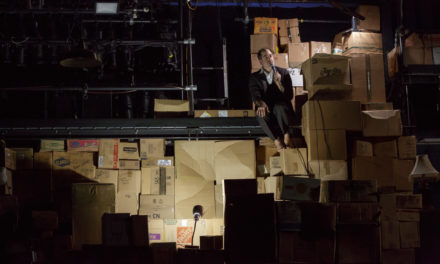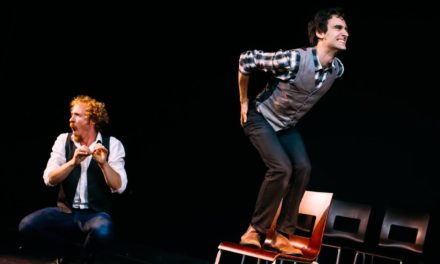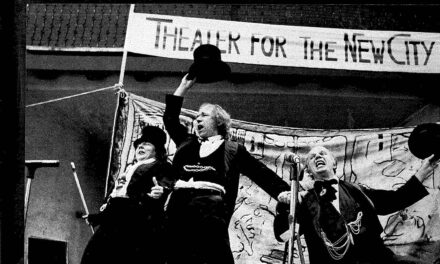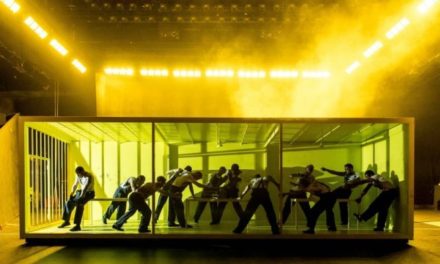Theatre Artist Inside look
Morgan Grambo, recent MFA graduate of Dramaturgy from the University of Iowa, gives us her perspective on the current climate in the field and the impact of the theatre on the world in our current crises for political and social change. Grambo is a graduate student from the University of Iowa with an MFA, and a certificate in Gender, Women’s and Sexuality Studies. Grambo is a dramaturg, teaching artist, and educator based in the United States with roots predominately in PA, CT, RI, MA, IA, and New York City across various demographics.

Morgan Grambo from the New Play Exchange
I first came to know Ms. Grambo through mentorship in undergraduate and graduate studies courses in the theatre arts department at the University of Iowa. In that time, I have found Morgan’s insight in her work of storytelling to be incredibly relevant to the surrounding impact theatre has had on current crisis. I asked to interview Grambo for this reason, for which she kindly agreed. The interview was conducted to further conversations about the global pandemic, dramaturgy, and social movements across the globe. Due to the ramifications of the virus and distance, the following interview was led online over email.
Q: Let us start at the beginning. Where you are from, and how did you get your start in theatre?
A: Last month I completed an MFA in Dramaturgy at the University of Iowa. I began a deep dive into theatre during undergrad, where I studied English Literature and Theatre Arts at Salve Regina University in Newport, RI. I’ve lived my life so far bouncing between PA, CT, RI, MA, and IA – with a few years in New York City before returning to graduate school. During my sophomore year of undergrad, I had a professor recommend that I try production dramaturgy for Columbinus by Stephen Karam and PJ Paparelli. While I didn’t know it at the time (and continued pursuing acting and directing for quite some time after), that experience launched my interest in production dramaturgy and eventually new play dramaturgy and literary management. I went on to pursue a few smaller opportunities before landing an apprenticeship at Roundabout Theatre Company in finance, which another skill that I’ve acquired over the years. I’ve learned that it all relates to a love of locating and analyzing patterns! Eventually, I held a full-time position at RTC while I pursued freelance dramaturgy and served as the Literary Manager of Athena Project – an organization that embraces, encourages and empowers women’s artistic contributions across disciplines – for three seasons.
I have just completed my MFA, and a Graduate Certificate in Gender, Women’s and Sexuality Studies, and graduated into a physically and mentally distressing moment. At the moment, I am lucky to have a day job and continue to pursue freelance dramaturgy while we orient ourselves in virtual theatre, continued play submission processes, and envisioning the future of American (and global) theatre.
Q: Have you always wanted to be a teaching artist, director, and dramaturg? What did you want to be when you were a kid? How have those dreams manifested into what you do now?
A: Until I was heading off to my first year of college, I believed that I was going to be a doctor. I remember loving AP Biology and that I was very into the idea of “being” a doctor (who knows how grounded that was). Of course, as many high school theatre kids do, I also dreamed of being an actor. That eventually expanded as I had the pleasure of seeing my sister expand her performance art into improv and sketch, and I had a lot of upperclassmen in undergrad showing what it meant to direct and take more leadership roles in the theatre. There was a brief moment where I thought I would be a director (with no-hyphen) and I still do direct on occasion (when it feels like a good fit, like with The Wolves in 2019 because I had played many, many years of soccer) or on short pieces (like at Iowa’s night of poet’s theatre).
Dramaturgy and teaching go hand-in-hand for me.
They both require an emphasis on asking questions, pulling forth boldness from our collaborators and students (artistically, intellectually, even in terms of silliness), and stoking the fires of curiosity in those we work with. I cannot imagine not having teaching be a part of my career path, that is definitely a major goal of mine. On the most basic level, I love curating reading lists and moderating discussions. Dramaturgy feels the same way and I’m continuing to look for ways to test its malleability outside of production. At the moment, I’m really interested in my role as an advocate for the production of new plays and how that aligns with research, having recently completed my MFA thesis entitled “Amplifying Indigenous, Feminist Voices On Stage” which surveys forty-two plays by Indigenous North American women written in the 21st century. It’s funny to think of a young person’s dreams manifesting as dramaturgy, but there are so many avenues to finding it that I think that must be true of us all!
Q: I must ask this, as you probably already know. Could you explain what a dramaturg is for those less familiar and what the role traditionally entails (especially in your case)?
A: The eternal question – and one that many others will define much better than I am about to do! For me, the practice of dramaturgy occurs at the intersection of analysis, context, and impact. It can be applied to many roles orbiting the theatre: production dramaturg (new or published works), an institutional dramaturg, critic, literary manager, scholar, historian, theorist, educator, writer, archivist, director, etc. (the list goes on forever). The dramaturgy of a piece often refers to how the storytelling operates, and it is a safe assumption that the “dramaturg” working on a production must have a solid understanding of that at minimum. In addition to working with the team creating a piece of theatre, dramaturgs simultaneously hold many audience-facing roles that can encompass marketing, outreach, engagement, and education. What I have found to be the key to performing dramaturgy is to have a flexible plan. Every experience is unique and has its own requirements that stem from the intended effects of the art being created.
Q: What was your experience like as an MFA Dramaturg for the University of Iowa? Not many people know this, but the University of Iowa is a top school for many graduate programs including for MFA and The Iowa Writer’s Workshop and is one of the only schools with an MFA program for Dramaturgy. Did this surprise you when you first became interested in applying? How has Iowa impacted your experience as a theatre maker?
A: I did not have as full of an understanding of Iowa’s role in the writing world as I should have when I applied. At the same time, I applied because the MFA in Dramaturgy is housed in the Iowa Playwrights’ Workshop. During my time at the University I was able to work closely with eighteen playwrights in the program. Since the class of dramaturgs is small (normally three across all the years), we had enormous production and new play dramaturgy opportunities. Luke Daniel White (my classmate of all three years) and I were able to practice our craft innumerable times, while taking rigorous course loads to expand our understanding of dramaturgy.
The University of Iowa has had a massive impact on me as a theatre maker. As with three years of schooling will do, I feel more confident in my initial approaches to plays (having experienced and responded to approximately seventy-two Monday night workshops). I had the space and time to reflect on what I value in a collaboration: positivity, clarity, and commitment. Most significantly, I’ve massively expanded my understanding and capacities as a researcher and writer on theatre. Also, it cannot be under-discussed how important it was that the University of Iowa covered my tuition and employed me during my degree, which is essential for leaving school with both a great amount of teaching experience but also loan-free.
Q: Why do you think dramaturgy as a profession remains such a vaguely understood position in theatre in America compared to other global institutions? Do you agree that it is often misrepresented? Why?
A: I think that it can be misrepresented, but not often intentionally. There are some dramaturgs that value production research above many other things, and unfortunately, that is the extent of how many other disciplines view us. The reality is: everyone should also be doing their own research, and we can do so much more. Additionally, I know that dramaturgical practices look so different person to person, region to region, that directors and writes sometimes do not know how to use us, or even worse, to ask for us at all. I think LMDA (Literary Managers and Dramaturgs of the Americas) continues to work hard to both provide clarity on this question, but also to create space for dramaturgs to gather to discuss the deeper and more nuanced ideas that our practice evokes.
Q: As a theatre artist, director, and dramaturg you have had extensive experience with community engagement, artist collaboration, administrative and leader-oriented positions, talkbacks with diverse artists and communities, wearing many different hats. What is the most rewarding and challenging parts of your job and what is your favorite part about being an artist in this field?
A: Every item on that list feels very related to me. The most rewarding part of being a dramaturg is deepening an experience, which is why I find so much joy in working with audiences, students, and artists on a variety of different tasks. There are so many avenues to “landing a moment” – with just the right piece of information in the lobby display or program, or the honest answer at a student matinee talkback, or responding to an on-stage moment when it works (or…does not). The most challenging thing is the continuous re-orientation of your practice in every collaboration, and even moment to moment. My favorite part of being an artist in this field is our ability to hold the somatic and the intellectual simultaneously, and the moment when the somatic fully takes over! I love a good catharsis.
Q: How has your role as a dramaturg impact your perspective on theatre? What about being a dramaturg benefits how you create theatre in our current crisis?
A: Studying dramaturgy has sometimes felt that it has verged on the hyper-critical, sometimes cynical – which was never intended but a result of the intensive practice no less. To serve as a dramaturg pushes you to expand your knowledge of who is writing what, where it is being produced, and significantly, the theories and histories of how theatre making works. As a dramaturg, I feel that my perspective on theatre forces me to hold a variety of disciplines in my conscious mind as I watch live performances (because ours may not be as obvious), in a way that I think often hinders practitioners of other disciplines in their viewings.
In terms of dealing with our COVID-19 pandemic and our immediate (and long-standing) crisis of police brutality, I believe that dramaturgs will be active members of revisioning and reinvigorating theatre. Personally, I have struggled to participate outside of the projects that were on my schedule prior to the theatre shutdowns, but I am hoping that I will find the motivation to work on something new (and likely, virtual) soon. I’ve always believed that collaboration is just conversation in different forms, and that is something that we still have the capacity to do, and due to that, I am hopeful.
Q: You studied Indigenous feminist history plays for your MFA thesis. Could you tell us about your thesis, what sparked the interest to study indigenous women and how it has impacted your work as a theatre artist and your overall perspective?
A: There is a lot of flexibility regarding what form an MFA thesis in Dramaturgy may take at Iowa. My focus has been feminist drama since I arrived in the program and I began a research project exploring history plays by Indigenous North American women in a class the first semester of my second year. In my third year, after an intensive research period, I produced a staged reading of Marisa Carr’s Reconciliation at the University. All of the researched plays and avenues to reading them are available on my website (https://www.morgangrambo.com/advocacy), alongside a brief “3MT” (three-minute thesis) audio clip highlighting the results of my research. The stakes for producing these plays on stage are incredibly high and in addition to advocating for their production, I have learned a great deal regarding our role as theatre artists in advocating for the ideas in our most significant works off-stage as well. I hope to continue to push for many of the pillars of Native feminist theories, especially challenging settler colonialism and foregrounding Indigenous ways of knowing, as I move through the word – and the learning and conversations are set to continue!
Q: Before the pandemic started, what were your plans after graduating with your MFA, have those plans changed and what does your career look like now that we are currently living this current quarantine lifestyle?
A: I am very lucky to have space to return to my mother’s horse farm in CT, where I will be living and working for the foreseeable future! My partner and I planned to return to NYC after our graduate educations but will continue to job hunt and collaborate on other projects remotely for now. One of our professors reminded us during our virtual graduation that the future was always uncertain, and I find that a comforting sentiment. I think working in our industry is incredibly challenging under perfect circumstances, so I am merely looking for the strength, curiosity, and passion to bridge this current moment. What I love about dramaturgy, as I’ve previously stated, is that I’ve learned how to contribute to the theatre community in so many ways, so I cannot imagine experiencing a shortage of ideas anytime soon.
Q: What theatre-making has inspired you most in your career so far and why? What stories strike a chord, and what do you think makes “good” theatre?
A: There are certain elements that I enjoy in a theatrical experience, but I would by no means call this an exhaustive list of what makes “good” theatre. 1) I like to learn something. Walking away with new information (either about myself, an idea, an event, a perspective) is critical for me. 2) I’m interested in women on stage. Not exclusively, but I’m drawn to pieces where this is essential to the project. 3) Pieces with dynamic structures. I appreciate a play that evolves in its form over the course of the theatrical experience. There are many more, but these are a few that would emerge the most for me!
There have been many pieces of theatre that I have seen that have left a lasting impression. Darko Tresnjak’s Hamlet at Hartford Stage. A reading of Too Heavy for Your Pocket by Jiréh Breon Holder in Roundabout’s Black Box. Paula Vogel’s Indecent was a particularly formative experience. I am inspired by so many writers and directors that I have observed from afar and have had the opportunity to work with. There are also many collaborations that I have been nourished by that continue to inform my work as I move forward in our field.
Q: Can you tell us more about any upcoming project(s) that you are excited to share? How are you handling our current pandemic crisis regarding your work and what are your aspirations for the near future? What is your hope for theatre moving forward?
A: I do not have any production dramaturgy lined up! As I have moved into survival mode for the near future, I have found exploring some of my solo projects a fruitful location for working. While I’m considering this period an “off-boarding” from graduate school, I have many ideas for workshops and courses that I am drafting, working on a publishable version of my thesis, and completing script coverage for a few organizations. It may not be the most valuable contribution to the theatre community, but that is my version of sustainability at the moment.
As we’ve heard from many others during this crisis, I hope that the perspective this moment has provided will force positive change when we return to something that looks a little more like normalcy in the theatre. I’m thrilled for those exploring virtual spaces or distanced theatre, but I cannot wait to gather again – whether in an audience or in a rehearsal room!
Thank you for taking the time to speak with me Morgan, and I hope our community can make a triumphant return soon. For more on Morgan and her work check out her website here. To learn more about my background check out my website here as well.
This post was written by the author in their personal capacity.The opinions expressed in this article are the author’s own and do not reflect the view of The Theatre Times, their staff or collaborators.
This post was written by Melissa Denzer.
The views expressed here belong to the author and do not necessarily reflect our views and opinions.

